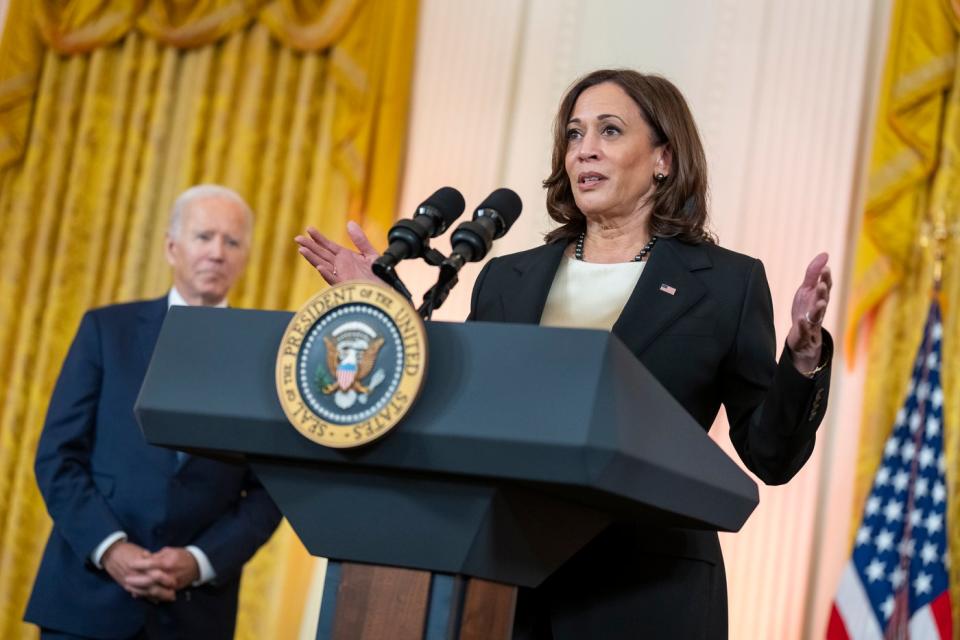Prediction: 3 of Wall Street’s Most Influential Stocks Can Plunge if Kamala Harris Wins in November

Four weeks from today, on Nov. 5, voters will determine which direction our great country takes over the next four years.
Although not every bill that comes out of Washington, D.C., has bearing on the stock market, the economic proposals that are, ultimately, put into place by the incoming president and Congress will help shape the landscape for corporate America in the coming years.

Current vice president and Democratic Party presidential nominee Kamala Harris has proposed sweeping changes designed to lower food and drug costs, expand a variety of tax credits for middle-class families, and wants to reduce the federal deficit by raising the corporate tax rate by 33%.
While some businesses would likely thrive with Harris in the White House, other high-flying companies may struggle.
What follows are three of Wall Street’s most-influential stocks that can plunge if Kamala Harris wins in November.
Meta Platforms
The first highly influential business that could find the going tough if Harris proves victorious in November is social media colossus Meta Platforms (NASDAQ: META), the parent company of Facebook, Instagram, and WhatsApp, among other social sites.
Meta sits atop the pedestal when it comes to social media websites. For the June-ended quarter, it attracted 3.27 billion daily active users across its family apps. No other social platform comes close to generating this level of daily visits, which is what provides Meta with exceptional ad-pricing power more often than not.
The concern for Meta is the potential for Harris and her administration to go after monopoly like businesses. In an interview with CNN while running for the Democratic presidential nomination in 2019, Harris suggested that she wanted to “take a serious look” at breaking up the company, and alluded that Meta (formerly known as Facebook) was “essentially a utility that has gone unregulated.”
Admittedly, the political views of elected officials can and do change over time. It’s not clear if Harris still believes that Mark Zuckerberg’s company is in need of stronger regulations designed to protect consumer privacy interests. Nevertheless, her remarks from 2019 signal the very real possibility of pitting the Harris administration against some of Wall Street’s most dominant companies.
The other reason Meta Platforms might struggle if Harris wins in November is her aforementioned plan to raise the corporate tax rate by a third — from 21% to 28%. Even though Meta is quite profitable from its advertising operations, a higher tax rate would expose the widening losses it’s contending with from its Reality Labs segment. This is the operating division focused on augmented/virtual reality devices and the company’s metaverse ambitions, among other projects.
While a higher corporate tax rate has historically been positive for the benchmark S&P 500, this might not be the case for Meta Platforms.

Novo Nordisk
A second market-leading company that could struggle mightily if Kamala Harris wins in four weeks is Danish-based pharmaceutical company Novo Nordisk (NYSE: NVO).
Novo Nordisk found its way into the spotlight thanks to its blockbuster duo of injectable glucagon-like peptide-1 (GLP-1) drugs, Ozempic and Wegovy. Ozempic is approved as a type 2 diabetes and long-term weight management treatment, while Wegovy is a weight management therapy for patients with at least one weight-related condition, such as type 2 diabetes, high cholesterol, or high blood pressure. GLP-1 drugs are the first prescription weight-loss breakthrough from big pharma in quite some time.
However, Harris has made bringing prescription drug costs down a key theme of her campaign. While the Joe Biden and Kamala Harris administration praised Eli Lilly for lowering the cost of GLP-1 drug Zepbound in August, it’s called on other GLP-1 drugmakers to follow suit.
Novo Nordisk doesn’t seem eager to heed that call. The company’s CEO, Lars Jorgensen, defended his company’s stance in front of a U.S. Senate committee in September to charge $1,349 (retail) for a 28-day supply of Wegovy and $968 (retail) for a 28-day supply of Ozempic. Novo Nordisk is heavily reliant on Ozempic to propel future earnings growth. Not to mention, Wall Street is counting on Ozempic to buoy the company’s outsized earnings multiple — 27 times forward-year earnings.
The uncertainty surrounding domestic drug pricing and what Harris would be able to accomplish in the Oval Office might be enough to halt what’s been nothing short of a parabolic move higher for Novo Nordisk over the last three years.
Apple
The third highly influential stock that could plunge if Kamala Harris wins in November is none other than Wall Street’s largest publicly traded company by market cap, Apple (NASDAQ: AAPL). Interestingly enough, this is a company that may also struggle if Donald Trump wins.
Apple is best-known for being a dominant force in tech products, such as the iPhone, iPad, and Mac. But the lion’s share of the company’s growth at the moment traces back to its Services segment. CEO Tim Cook is overseeing a multiyear transformation that’s emphasizing the importance subscription services. A subscription-driven model should, ideally, improve the company’s operating margin over time and smooth out the revenue valleys that often occur during iPhone upgrade cycles.
But Apple could face something of a double whammy if Harris were to win and is able to implement the full scope of her economic proposals.
To begin with, raising the corporate tax rate by 33% would potentially leave Apple with less capital to funnel toward share buybacks. No public company has more directly benefited from share repurchases than Apple.
Since the start of 2013, Apple has repurchased $700.6 billion worth of its common stock, which has helped to increase its earnings per share (EPS) from what would be less than $4 in fiscal 2024 (ended Sept. 30, 2024) if it had never bought back its stock, to a consensus estimate of $6.68 per share in the current fiscal year. Without significant buybacks, Apple’s stalled growth engine would be exposed.
Additionally, Kamala Harris has proposed taxing unrealized capital gains. Although this tax is strictly focused on individuals with net wealth above $100 million, a lot of the wealthiest tax payers are likely to have a stake, directly or via exchange-traded fund, in Wall Street’s largest company by market cap.
Whether it’s Donald Trump’s proposed 60% tariff on imports from China or Harris’s plan to increase taxes on the ultra-wealthy and businesses, there’s a real possibility Apple comes out a loser on Nov. 5.
Should you invest $1,000 in Meta Platforms right now?
Before you buy stock in Meta Platforms, consider this:
The Motley Fool Stock Advisor analyst team just identified what they believe are the 10 best stocks for investors to buy now… and Meta Platforms wasn’t one of them. The 10 stocks that made the cut could produce monster returns in the coming years.
Consider when Nvidia made this list on April 15, 2005… if you invested $1,000 at the time of our recommendation, you’d have $765,523!*
Stock Advisor provides investors with an easy-to-follow blueprint for success, including guidance on building a portfolio, regular updates from analysts, and two new stock picks each month. The Stock Advisor service has more than quadrupled the return of S&P 500 since 2002*.
*Stock Advisor returns as of October 7, 2024
Randi Zuckerberg, a former director of market development and spokeswoman for Facebook and sister to Meta Platforms CEO Mark Zuckerberg, is a member of The Motley Fool’s board of directors. Sean Williams has positions in Meta Platforms. The Motley Fool has positions in and recommends Apple and Meta Platforms. The Motley Fool recommends Novo Nordisk. The Motley Fool has a disclosure policy.
Prediction: 3 of Wall Street’s Most Influential Stocks Can Plunge if Kamala Harris Wins in November was originally published by The Motley Fool








